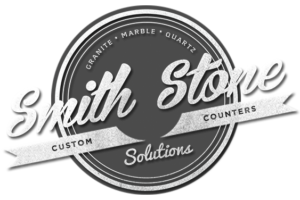Frequently Asked Questions
Caring for my new countertops
1) Does granite have to be sealed?
While not absolutely necessary, all of the granite countertops installed by Smith Stone are sealed as an added layer of protection. Although the sealer will not affect the colour of the stone, it will penetrate the natural pores in the stone to help prevent any permanent stains. The sealer does not however completely stop the penetration of moisture.
2) How do I know if I need to re-seal my granite?
To check if your granite needs to be resealed, sprinkle water on your countertops. If the water soaks into the stone and does not form a bead of water on the counter, then we would recommend resealing your granite. We can recommend granite sealing products to help maintain your granite for years to come!
3) How do I clean my granite?
Granite needs to be cleaned with non-abrasives material to keep the finish. Low acidity cleaners such as mild dish detergent and warm water are the best to use, and there are also commercial granite cleaners available. It is important to wipe up any spills and liquids quickly to avoid absorption into the pores.
4) What happens if my granite is cracked?
In most cases, if granite is cracked, it will need to be completely removed and replaced.
Working with Smith Stone
1) Can you give estimates via email or over the phone?
We will be happy to provide an approximate estimate provided measurements and layout are supplied. Please make all the measurements as accurate as possible and mark special areas (walls, curves, appliances etc.), indicate your preferred edge, colors, and type of sink (undermount or drop-in). While we are happy to provide estimates via phone and email, official quotes cannot be finalized and provided until we have measured the project.
2) How long is the process at Smith Stone?
There are a number of factors that can impact how quickly we can install your countertops:
Availability of colours chosen
Client and Smith Stone’s availability for measurements and installation
Fabrication schedule
Please see our page on ‘PROCESS’ for more information. While we strive to complete all administrative work as quickly as possible, timing does depend on both the client as well as factors such as scheduling and choice of material.
3) How long will it take to install granite?
We will complete fabrication in our shop and so the actual installation should take approximately 3-4 hours on-site.
4) Can you reconnect my electrical and plumbing?
We are not licensed electricians or plumbers thereforewe cannot make electrical or plumbing re-connections. We can, in some instances however, recommend reputable and licensed individuals or companies to complete these tasks for you. This keeps us focused on the natural stone business to provide the best product for the lowest cost. When we leave your home the sink is fully installed on (or under) the countertop, but a plumber or the homeowner will have to re-connect faucets and drain lines the next day after all the adhesives and caulks have fully cured.
5) What are your payment terms?
A 40% deposit is required upon signing the quote for any installed jobs. A quote is invalid after 20 business days if no deposit has been received. Measurements, fabrication, any special products or orders will not begin, nor will installation dates be booked until a deposit has been received. If paying by cheque, the cheque must clear before any special order products are ordered. The balance (60%) is due upon completion of the installation. It is the responsibility of the homeowner to ensure prompt payment.
For pick-ups, 100% payment is required upon pick-up of material only and 100% on ordering if any fabrication is required.
The quoted price is for payments made by cheque, MO, bank draft or cash. Credit Card payments are subject to a 2.95% processing fee which will be added to the final amount.
HST applies to all purchases, regardless of method of payment. This is the law, and we follow it.
Planning for Granite Countertops
1) How will I know if my old cabinets can support new countertops?
Stone countertops can weigh upwards of 18lbs/sqft and so it is important to ensure your cabinets can support the stone to avoid problems such as seam separation. When we visit for measurements, we will also verify that your cabinets can handle the weight of the stone and suggest reinforcements if necessary.
2) You’re coming tomorrow! What should I do?
Ensure Access – Natural stone countertops are extremely heavy, and installers need clear access to entry ways. Please have your walkways and driveways cleared as well as a path to the area to be installed.
Cabinets – recommend you empty all cabinets and drawers.
Secure delicate items – Please remove any breakable items and cover items to protect them from the dust that can be created during the installation process.
Faucets – Please have any faucets or other items (soap dispensers etc.) that need to be drilled into the countertops ready.
Removing old countertops – Unless otherwise stated, the old countertops are to be removed by the homeowners prior to installation.
Plumbing- – All plumbing is to be disconnected prior to Smith Stone installing the countertops. Smith Stone will fasten the sink but will not reconnect any plumbing. All plumbing work, unless otherwise stated, is the responsibility of the homeowner.
Appliances – Large appliances are to be removed and out of the way prior to install as they can get inadvertently damaged during installation process.
3) How long are the slabs, and can seams be avoided?
Granite slabs vary in size but on average are between 110 and 130 inches long by 60 to 75 inches tall. Slabs of Quartz are a smaller at 120 x 55 inches. We will work with you to ensure the fewest seams as possible however seams are required based on slab size and may be needed to maintain the structural integrity of the countertop.
The visibility of seams will vary depending on the colour of the stone. Granites with a lot of movement may have more visible seams.
4) How much overhang can my natural stone support?
For 3cm stone, supports and braces are recommended for overhangs greater than 8″.
5) How thick is your granite?
All of our granite is 1 ¼” thick, while quartz is available in ¾” or 1 ¼“ thicknesses. 1 ¼” slabs of granite are not only aesthetically pleasing but are also more structurally stable.
6) Why doesn’t my granite look like the show room?
Granite is a natural, organic stone and just like any item in nature, no two pieces will look exactly the same. The composition of minerals and the deposit it was quarried from impact the colours, spots and veins.
Viewing and approving material prior to fabrication may be recommended depending on the color. If your project is being completed in stages it is recommended you pre-purchase the materials to ensure your granite is all from the same slab and to avoid any major variations.
7) What type of sink should be used?
The ideal sink varies based on personal preference and space available. To maintain the structural integrity of the countertop at least 3″ of stone should be maintained surrounding the perimeter of the sink cut out. The sink must be provided to Smith Stone to allow for proper templating and cutting. Smith Stone is an authorized distributor of Bristol Sinks! Talk to us today about the various models available or visit www.bristolsinks.com.
8) What are my edging options?
Pencil edging comes standard with all granite provided by Smith Stone. Other edging options are available including: Straight, Eased, Full and Half Bull nose, Bevel, and Ogee. Alternative edging is priced separately.
Granite, Marble or Quartz?
1) Can Marble be used in the kitchen?
Marble is not recommended for use in the kitchen as it is easily stained and scratched. Marble is an excellent choice for vanities, wet bars and fireplace surrounds.
2) Can I really cut on granite?
Yes, granite is an extremely tough and durable stone which can be used as a cutting surface without fear of scratching the stone. You should be aware though, that cutting directly on the granite will not only dull your knives, but overtime it will also dull the surface of the granite.
3) Can my countertops burn?
Under normal conditions, granite and marble will not be damaged by hot pots or open flames. It is not however recommended to place hot pots, pans or flames on quartz as the pigments and resins can discolour when exposed to extreme heat.
4) Do stone countertops add value to my home? What is the life expectancy of granite?
Countertops made of natural stone add resale value to your home. As granite lasts a lifetime, after the cost of the initial installation (with proper maintenance and care) they never need to be replaced.
Granite takes thousands of years to form, and upon installation it will probably last another thousand years.
5) What is the difference between Marble and Granite?
Although both are stones and both are quarried from the earth, granite and marble are very different from each other. Granite is formed deep in the earth’s mantle at extremely high temperatures, and is a very hard, resistant stone made of crystallized minerals. The marble family – limestone, travertine, marble, and onyx – starts out as sediment – animal skeletons and shells, plant matter, silt – at the bottom of bodies of water. After millions of years this solidifies into stone. Because its main component is calcium, acids such as vinegar and citrus beverages will etch it.
6) What is the difference between granite and quartz?
Quartz countertops are a man-made product containing approximately 93% quartz mineral and 7% pigments and resins. The resins give quartz countertops their non-porous properties but also their sensitivity to heat. Additionally, overexposure to ultraviolet rays can result in subtle discoloration and as such, quartz countertops are not recommended for outdoor applications.

